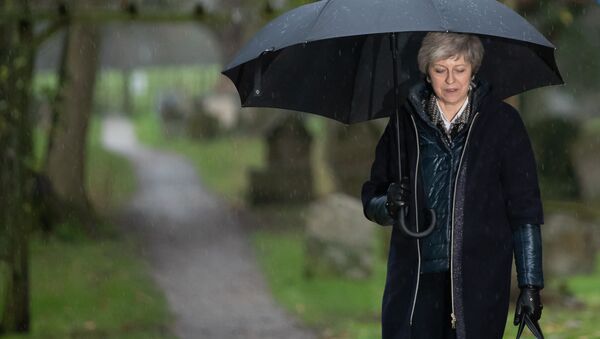UK Prime Minister Theresa May has made a last-ditch phone call to European Commission President Donald Tusk, which came amid reports that she agonized when contemplating postponing a "doomed" vote on the Brexit deal slated for Tuesday, according to The Telegraph.
Downing Street described the call as a "routine" event ahead of May's visit to Brussels where she will attend a two-day European Commission summit.
READ MORE: 'She Selling It Double': May Promoting Brexit Deal as Least Worst Option — Prof
However, The Telegraph cited diplomatic sources as saying that May used the call to make it clear to Tusk that she could lose her grip on Brexit if the Tuesday vote rejects the Brexit agreement.
"Despite the official line being that the vote will definitely happen, there are still discussions going on in Downing Street about whether it should be postponed, and for how long. The Chief Whip is nervous […] He kept telling the PM we could win the vote when it was obvious to everyone we had no chance", one source said.
Earlier, former UK Foreign Secretary Boris Johnson wrote in an article published by The Telegraph that although Britain "certainly" wants the Brexit deal, "the appalling constraints of the Irish backstop" should be rejected.
READ MORE: Fate of Brexit Deal Foggy As Tempers Flare, Tensions Rise in UK — Politicians
According to him, MPs from all parties are poised to "bin the backstop", resolve the Irish border issue as part of negotiations on a trade deal and "massively step up our preparations for leaving without an agreement".
"Everyone can see that if we accept the terms of the backstop, we can kiss goodbye to those free trade deals and almost all the other potential economic benefits of Brexit", Johnson pointed out.
He expressed hope that during the Tuesday vote, a "huge proportion" of the MPs will justifiably cite the backstop as the reason for their decision "to throw out" the Brexit deal.
READ MORE: Legal Advice on Brexit Deal Reveals the 'Unthinkable,' Leaving MPs Furious
In late November, Prime Minister May and the EU struck an agreement that lays out the terms of the UK's divorce from the EU.
The leading Brexiteer Jacob Rees-Mogg earlier described May's agreement as a "rotten deal". Its most controversial propositions concern the future of EU citizens in the UK and British citizens residing in the EU, the framework of bilateral EU-UK trade relations, and the "regulatory regime proposed for Northern Ireland".



